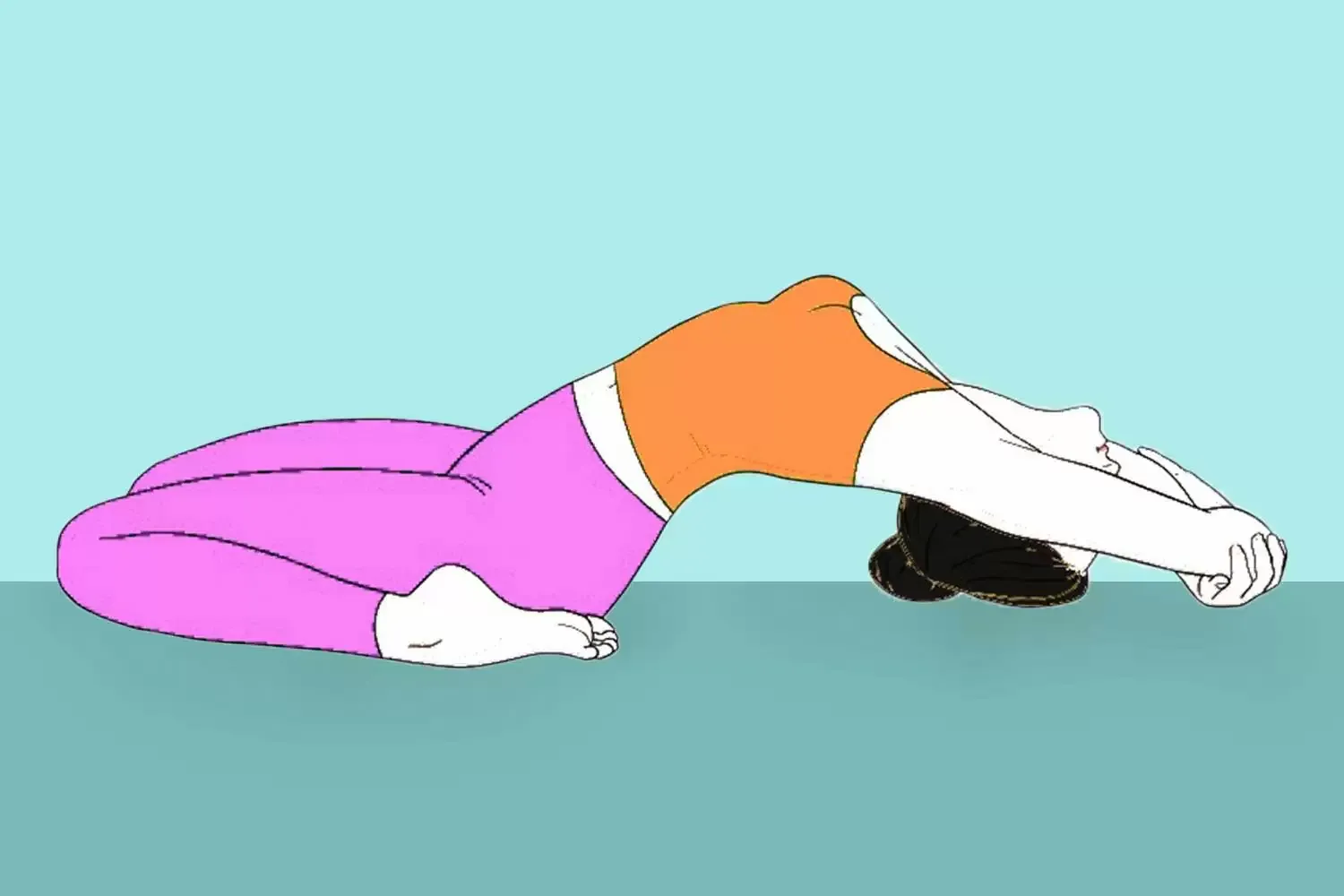Ayurveda & Yoga For PCOS – 10 Most Powerful Poses
Hormonal conditions like PCOS can be managed with daily Yoga

Polycystic ovarian syndrome has become a modern-day calamity for women as it does not only affect physical health but mental and emotional health as well. PCOS affects 4% – 20% of women of reproductive age across the globe.
One may wonder how ancient sciences like Yoga and Ayurveda would help combat such a complicated disorder. Even with modern advancements in technology and drugs, we are far from achieving absolute health. It is in times like this when an all-inclusive approach like Yoga for PCOS comes to mind. Yoga has upped the ante in healthcare and we are going to experience just how and that too from the comfort of your home!
Highlights
What is PCOS?
As the name suggests, there primarily is a presence of multiple cysts on the ovaries which tamper with their regular function. PCOS is a lifestyle disorder involving multiple systems in the body caused mainly due to incorrect lifestyle habits, improper diet, stress and hormonal imbalance. Sometimes, heredity can be a predisposing factor too.
Polycystic ovarian syndrome is a psychosomatic disorder manifesting traits that are both psychological as well as physical. The psychological aspects include symptoms like irritability, mood swings, decreased concentration, reduced appetite and fatigue. While irregular menses, multiple cysts on ovaries, lower abdominal pain, unexplained weight gain, hirsutism, male pattern baldness, acne, etc are indicators of the physical aspect.
In this condition, the ovaries produce an excessive amount of a male hormone called ‘androgen’ which in turn checks the maturation of ovarian follicles. This interferes with the proper formation and release of the ovum resulting in anovulation or amenorrhoea.
Ayurveda for PCOS
In Ayurveda, the balanced state of doshas, Agni (digestive fire), dhatus (tissues), malas (body waste), atma (the soul), indriya (senses)and manas (psyche) are responsible for a completely healthy individual. Any derangement of this state can lead to diseases. Ayurvedically, PCOS is not considered a single disease. It is a combination of various Yoni vyapata (uterovaginal disorders).
Understanding the role of the doshas in the reproductive system
Vata dosha: It is responsible for the movement of follicles in the ovaries during their development, rupture of the ovarian wall to release the mature ovum, the action of the fimbriae which guide the ovum into the fallopian tube.
Pitta dosha: It can be correlated with ‘hormones’ and is responsible for all of the metabolism and transformational activities in the reproductive system.
Kapha dosha: It provides nourishment to the growing follicles and the uterus. It also aids in the development of a fertilised egg.
Pathogenesis of PCOS
The prolonged consumption of improper diet and a sedentary lifestyle vitiate the Vata and Kapha dosha. This diminishes the Agni (digestive fire), resulting in the production of Ama (toxins) in the body.
This Ama production causes inappropriate formation and metabolism of the dhatus (tissues). The imbalanced Vata and Kapha dosha along with the mamsa (muscles), meda (adipose tissue) and artava (reproductive fluid) form inflamed knots called ‘granthis’ or ‘cysts’ in modern terminology.
PCOS specific effects of Yoga
Yoga essentially is a self-care tool and a preventive measure to cope with various disorders. It cannot directly cure PCOS, but it can help relieve the symptoms as it helps with some of the major causes like stress and hormonal imbalance, as follows:
1. Weight reduction
Practising Yoga affects the overall metabolism of the body which leads to proper digestion and assimilation of food and prevents the production of excess toxins, thus leading to gradual weight loss. Doing yoga to reduce belly fat is one of the important ways of dealing with PCOS.
2. Addressing hormonal imbalance
Pranayama (breathing exercise) works on calming the nervous system by synchronised breathing. This directly affects the endocrine system by reducing the levels of the stress hormones cortisol and adrenaline.
3. Impeding insulin resistance
Regular practice of Yoga builds muscle mass which helps deal better with insulin resistance by improving the sensitivity of beta cells to glucose. This can cause another hormonal problem, prediabetes. Yoga also increases the blood supply to muscles, thereby improving glucose uptake. You can reverse prediabetes naturally with Ayurveda & Yoga.
4. Stimulating the reproductive system
Several yoga practices directed to work towards reproductive organs can improve circulation and the pressure helps gently massage these organs. Certain asanas also improve flexibility and strengthen the hips.
5. Relieving stress
It is well proven how Yogic practices reduce stress and anxiety in an individual by relaxing the body, mind and spirit altogether and increasing the levels of androgens as well.
Yoga poses for PCOS
1. Baddha Konasana (Butterfly pose)

This asana is called so because of the way both feet are placed close to the pelvis and the hands hold them in place as though they are bound at a particular angle. It is also known as a butterfly pose because the movement of the legs is similar to that of a butterfly flapping its wings. This is a simple yet effective yoga for PCOS.
Benefits :
Stimulates the mooladhara chakra (root chakra).
Strengthens the hips, thigh muscles and glutes.
Increases flexibility of legs and spine.
Brings groundedness and stability.
Contraindications :
Disorders of the lower back.
Sciatica.
Pelvic or knee injury.
2. Paryankasana (Couch pose)

This pose is an intermediate level backbend done in continuation with Supta Virasana. The body is arched backwards to resemble a couch, hence the name. You should do this relaxing yoga for PCOS problems.
Benefits :
Stimulates the Vishuddha chakra (throat chakra), Ajna chakra (third eye chakra) and Sahasrara chakra (crown chakra).
Relieves menstrual pain and PMS (Premenstrual Syndrome) symptoms.
Reduces mental stress due to increased blood flow to the brain.
Contraindications :
Ankle and knee injury.
Pregnancy.
Lower back stiffness.
3. Vajrasana (Thunderbolt pose)

One of the most powerful yoga poses, Vajrasana activates the Sushumna nadi (a channel along the spine) and redirects energy into the brain for spiritual awareness and growth. A bonus is how easily you can slip into this posture! You should definitely go for this pose among yoga for PCOS complications.
Benefits :
Stimulates the Mooladhara chakra (root chakra), Swadhisthana chakra (sacral chakra) and Ajna chakra (third eye chakra).
Prana (life force/breath) is smoothly transported throughout the body.
Strengthens the pelvic muscles due to improved blood circulation and nerve impulses in the pelvic region.
Improves digestion and is the only pose that can be practised after meals.
Increases levels of focus and concentration.
Contraindications :
Stiffness and pain in the lower limbs.
Slipped disc.
4. Salabhasana (Locust pose)

This asana involves lying down in a prone position and bending the spine backwards resembling a locust.
Benefits :
Stimulates the Mooladhara chakra (root chakra), Swadhisthana chakra (sacral chakra), Manipura chakra (solar plexus chakra) and Vishuddha chakra (throat chakra).
Acts on parasympathetic nerves in the lower back region and improves blood circulation.
Removes excess fat around the pelvis.
Aids in the proper functioning of reproductive organs.
Contraindications :
Pregnancy.
Hernia.
Spinal issues.
5. Ushtrasana (Camel pose)

The practitioner in a kneeling position bends backwards to touch the heels resembling a camel that bends its knees and legs beneath its own body while sitting. Performing this yoga for PCOS will not only relieve your symptoms but also improve lower abdominal health.
Benefits :
Stimulates the Manipura chakra (solar plexus chakra), Anahata chakra (heart chakra), Vishuddha chakra (throat chakra), Ajna chakra (third eye chakra) and Sahasrara chakra (crown chakra).
Reduces tension around the ovaries and reproductive system.
Regulates the menstrual cycle.
Decreases fat on the thighs, arms and hips.
Opens up the chest.
Improves flexibility of spine and hips.
Contraindications :
Back and neck injury.
High or low blood pressure.
6. Paschimottanasana (Forward bend pose)

It is an easy forward bend pose where the upper body is bent over the legs to hug the lower body. It works towards balancing the inward and outward energy (prana and apana vayu respectively) flow throughout the body. This a helpful asana for PCOS and other gynaecological problems, like period cramps and bloating.
Benefits :
It stimulates the Mooladhara chakra (root chakra), Swadhisthana chakra (sacral chakra), Manipura chakra (solar plexus chakra) and Vishuddha chakra (throat chakra).
Pressure is put on the digestive and pelvic organs while bending forward.
Aids in menstrual disorders.
The intense stretch of the spine stimulates the central nervous system.
Contraindications :
Spinal injury.
Asthma.
Diarrhoea.
7. Ardha Matsyendrasaa (Half lord of the fishes pose)

It is one of the best Yoga for PCO and most important asanas in Hatha Yoga and spiritual practices. In a sitting position, the practitioner undergoes a full spinal twist which affects almost all body systems.
Benefits :
It stimulates the Mooladhara chakra (root chakra), Swadhisthana chakra (sacral chakra) and Manipura chakra (solar plexus chakra).
Due to pressure on the liver and pancreas, digestion is improved.
Cleanses the liver, heart, kidneys and spleen.
Relieves menstrual discomfort by releasing excessive heat and toxins from the body, improving circulation while also opening up the pelvic region.
Stabilises and calms.
Contraindications:
Pregnancy.
People who have undergone surgery.
Hernia.
Abdominal and spinal disorders.
8. Pavanamuktasana or Apasana (Wind relieving pose)

An especially great asana for beginners to practice and provides great benefits too! It involves simply lying down in a curled up position with your knees placed on your chest.
Benefits :
It stimulates the Manipura chakra (solar plexus chakra).
Releases unwanted and accumulated gas and aids digestion.
Helps get rid of excess fat in the abdominal region.
Improves blood circulation in the reproductive organs.
Strengthens muscles of the lower back.
Contraindications :
Hernia.
Piles.
Hypertension and cardiac conditions.
Neck or back problems.
9. Balasana (Child’s pose)

It is an amazing yoga for PCOS health management. This asana involves bowing down from Vajrasana position so that the forehead touches the ground. It resembles a child-like/foetal position and symbolises humility and devotion.
Benefits :
It stimulates the Mooladhara chakra (root chakra), Swadhisthana chakra (sacral chakra), Manipura chakra (solar plexus chakra), Ajna chakra (third eye chakra) and Sahasrara chakra (crown chakra).
Calms the body and mind. Hence, alleviating anxiety and insomnia.
Including this yoga for PCOS will massage your internal organs and improve their functioning.
Brings awareness back to the body and breath.
Contraindications :
Abdominal disorders.
Spondylitis.
Knee injury.
10. Viparita Karani (Legs up the wall pose)

A super easy to do asana for energising, de-stressing and relaxing the body and mind. Simply lie down with your legs stretched over a wall! This is the best connecting link between asana and pranayama as it directs spiritual energy flow throughout the body. Try doing this yoga for PCOS and back pain.
Benefits :
It stimulates the Manipura chakra (solar plexus chakra), Vishuddha chakra (throat chakra), Ajna chakra (third eye chakra) and Sahasrara chakra (crown chakra).
Increases awareness, focus and concentration.
Improves body alignment and posture.
Soothes the entire nervous system.
Enhances blood circulation.
Contraindications :
Hypertension and cardiac disorders.
Neck or back injury.
Eye disorders.
Pranayama for PCOS
Regular practice of pranayama yields tremendous benefits for general health and day to day life. It can help you manage common hormonal problems and prevent them from taking severe form.
1. Bhramari
Also known as the ‘humming bee breath’, Bhramari pranayama instantly calms the body and mind by stimulating the pineal and pituitary glands. This in turn helps with hormonal imbalances caused due to stress factors.
2. Bhastrika
It is also known as ‘bellows breath’ or ‘yogic breath of fire’ due to the particular sound made while practising it. Bhastrika mainly clears out the nadis (body channels) and increases metabolism right at the cellular levels which helps get rid of abdominal fat caused due to insulin resistance.
Advice: A few minutes of nadi shodhana, kapalbhati pranayama along meditation can be useful for PCOS as well.
Key takeaways
The ancient wisdom of Ayurveda and Yoga do take time to show positive results but are deep-seated and long-lasting.
Many people are already taking advantage of this Vedic knowledge, it is time for you to manage your PCOS symptoms with Yoga for PCOS. You can expect a qualitative difference through this holistic approach.
Want to treat the root cause of your ailment? Consider going back to your roots as well!
FAQs
What are the first signs of PCOS?
The first signs that women may experience due to high levels of androgens are –
Missed menstrual periods/irregular periods
Unexplained weight gain
Acne on face
Hair loss
Excess facial hair or hirsutism
High blood glucose due to insulin resistance
It is very important to notice these signs and get tested before the situation gets worse. But there are many preventive and curative remedies in Ayurveda and Yoga for PCOS, that comes with no side effects if followed carefully.
Is PCOS a serious problem?
PCOS is a hormone-related disorder. One health problem in the body ultimately leads to the other. The most common one associated with PCOS is prediabetes which can later develop into diabetes.
It also leads to obstruction of fallopian tubes and cyst formation. These cysts may be too many or very big in size that surgery may be needed.
PCOS also increases the risk of becoming cancerous.
Is PCOS curable?
Yes, PCOS is a health problem that affects hormone levels and that further triggers other health issues like diabetes, obesity, weakness, etc. since it is a hormone-related problem, following a dosha pacifying diet plan, practising yoga and doing meditation are highly important for curing PCOS.
Pacifying Kapha, excess of which is related to obesity and weight gain, is an effective step to reversing PCOS naturally at home.
What is PCOS in a woman?
Polycystic Ovary Syndrome (PCOS) is a common health condition affecting 1 in 5 women of reproductive age. The primary cause of PCOS is still unknown but it is found that factors like genetics and lifestyle play a huge role in elevating PCOS symptoms.
Can someone with PCOS get pregnant?
PCOS generally affects the ability of women to get pregnant. It is due to the imbalance of the 3 doshas. A balance of these doshas, vata, pitta & kapha is required to conceive and hold the foetus.
It has been researched that infertility due to PolyCystic Ovarian Syndrome can be successfully cured by using an Ayurvedic treatment regimen and performing a few sets of specially selected yoga for PCOS.